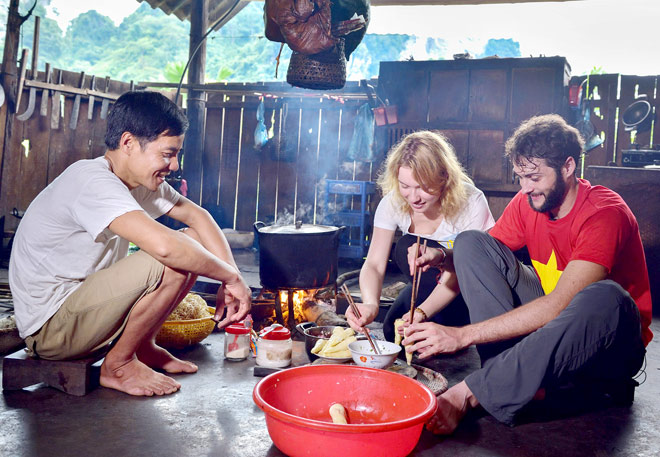 Foreign visitors experience the making of meat-stuffed bamboo shoots with a local family in Nam Dip village, Lang Can commune, Lam Binh district. |
Food is not only to fill the stomach, it has become the purpose of many journeys. That is why food is often dubbed the ambassador of tourism.
The mountainous province of Tuyen Quang is home to 22 ethnic groups, each of which has their own cultural characteristics, as can be seen in their languages, costumes and traditional foods. Most of the foods are made using the speciality ingredients of the mountains and forests where they are living.
If visitors have a chance to enjoy local food of Tuyen Quang province, they will never forget such specialities as buffalo dried on the kitchen roof and forest bamboo shoots in Lam Binh; maize alcohol, dried buffalo meat, sour meat and river fish in Na Hang; bánh gai (a dessert made of rice, mung bean and ramie leaves), and fish paste in Chiem Hoa; rice cooked in bamboo stems; jasmine rice and duck in Ham Yen. Several famous specialities such as fish pastes and maize alcohol have been granted trademark certificates.
Food is a true reflection of a region’s culture and its people. A same food can give different tastes to diners when it is placed in different settings, made with different ways by different people.
Many tourists will feel nostalgia when having a meal with wild vegetables, snails caught from small streams and five-coloured xôi (steamed glutinous rice) under the homestay stilt houses in Lam Binh village in Na Hang district. Many tourists from the Delta region find the exotic names of some foods such as “long-legged dancer”, “water moss cake”, “ant egg rice cake” and “pig tongue bamboo shoot” fascinating. Many young people are very excited to experience grilled fish, “rocket” pork and hill chicken on the bank of a stream.
Ms Vo Nhu Ngoc, a tour guide at the Hanoi-based Global Open Tour, who usually guides tourists to Tuyen Quang said “Tuyen Quang has many unique foods typical of ethnic culture. I am impressed by local foods such as sour meat, vegetable fern and arrowroot soup. Many are both daily foods and medicine, such as green chireta leaf soup, which is good for the guts, and fish paste, which is an effective detoxicant.
Mr Hoang Van Lam, from Nghe An province, was fascinated when tasting Tuyen Quang foods. He said that what is special about Tuyen Quang foods is not only that their flavours are attractive but there are also interesting stories behind such foods.
One typical example is the five-coloured xôi glutinous rice, whose five colours represent the five elements of nature: metal, wood, water, fire and earth. The dried water buffalo meat is to be used for long forest treks of mountainous people who hope that the meat will help them have enduring strength and bring them good luck.
Aware of the importance of the food culture in attracting tourism, the local tourism authorities have held many activities to promote the local culture, especially the food culture. A notable activity is a programme to exhibit and introduce food at the annual Tuyen Quang Citadel Festival, where tourists have an opportunity to visit and enjoy many local specialities of the province.
Mr Do Trung Kien, Director of the Tuyen Quang Investment Promotion Centre, stated that the province has also instructed travel agencies to design tours which combine sightseeing with enjoying local foods, such as rice cooked in bamboo stems in Tan Trao commune (Son Duong), My Lam (Yen Son) and ramie cake (Chiem Hoa).
In addition to introducing and promoting local food, attention is also given to food safety. According to Nguyen Thi Hue at the provincial culture and tourism department, the province currently has 284 restaurants. Every year the Department of Culture, Sports and Tourism cooperates with the Hanoi Tourism College to sharpen food-making skills for restaurants and accommodation facilities in the province. As part of the training programme, lecturers from the Hanoi Tourism College provide restaurant and hotel owners, cooks and staff with basic knowledge about food preparation, with a particular focus on food safety, arrangement and adequacy so as to avoid wastefulness.
Exploring and enjoying foods is one of the interests of many travellers. Therefore, promoting the food culture in alignment with tourism will be a positive approach for Tuyen Quang province’s tourism industry to grow further.

Comment
Print